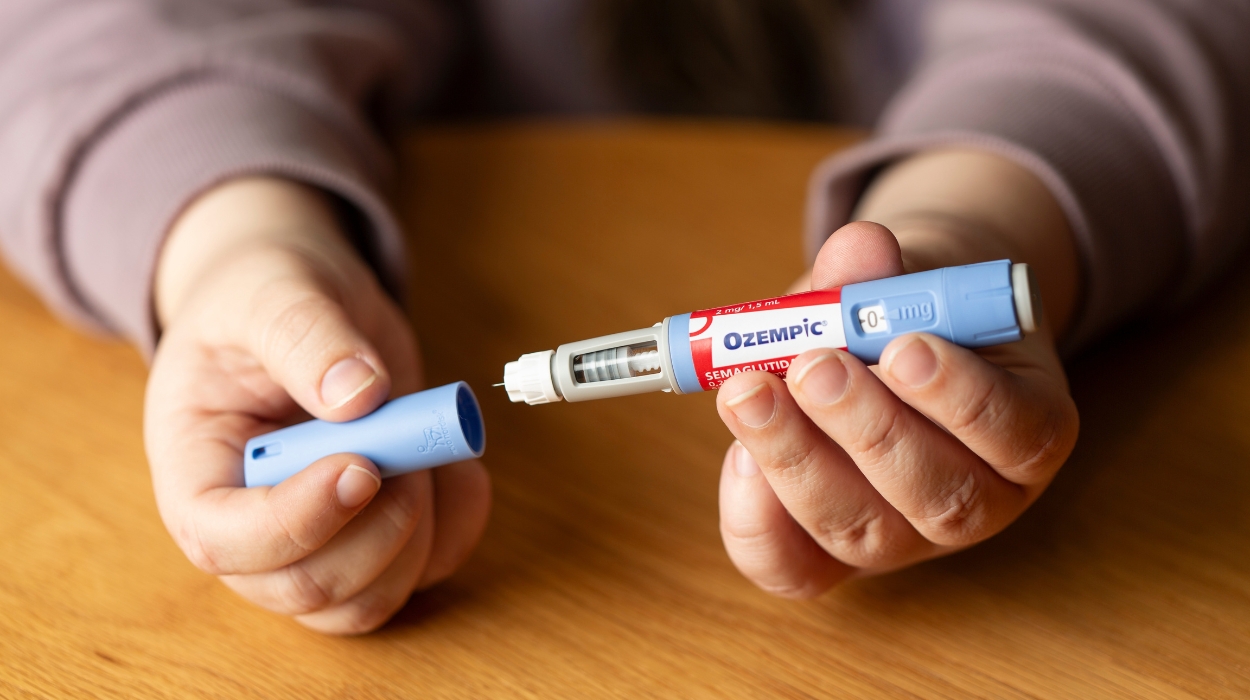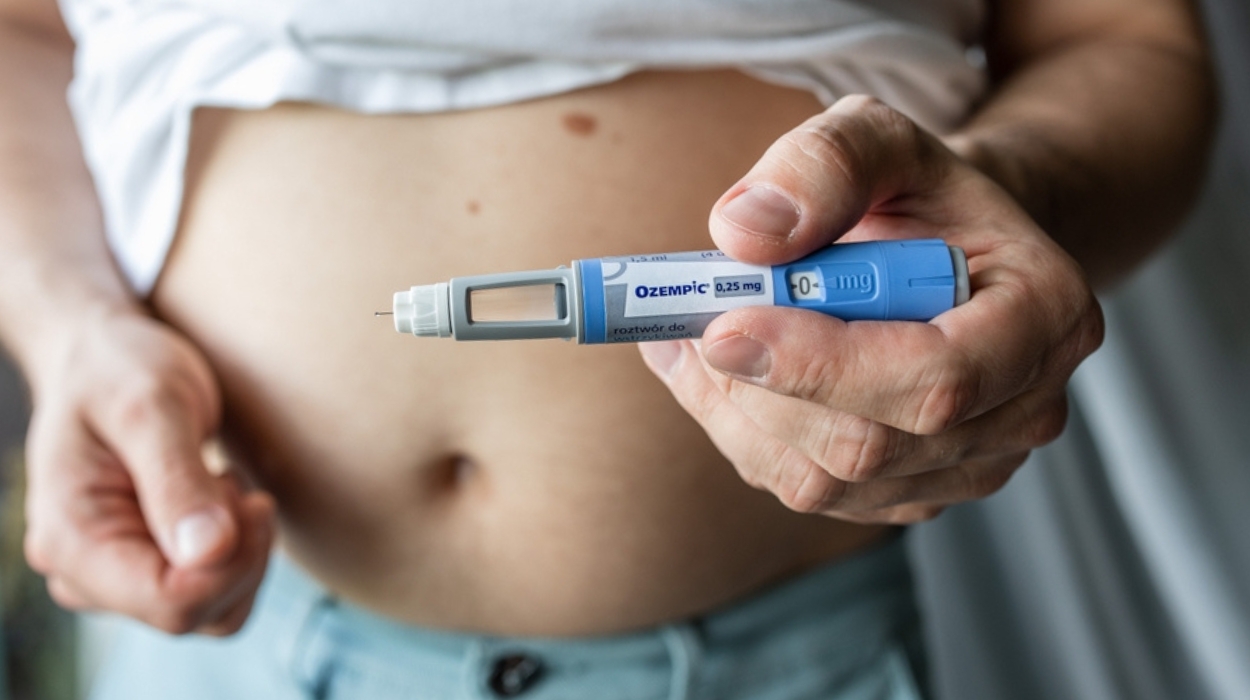Ozempic has gained increasing attention as a treatment for type 2 diabetes and a weight loss drug. This medication has demonstrated[1] promising results in effectively managing blood sugar levels and inducing significant weight loss in obese and overweight individuals.
Ozempic is a glucagon-like peptide 1 GLP-1 agonist, which mimics the natural effects of the hormone[2] GLP-1 in the body, reducing appetite and slowing gastric motility. The results of this medication make it much easier to achieve a calorie deficit to lose weight. Over time, this medication leads to significant weight loss in many individuals.
However, what happens if you stop taking Ozempic? Do the dropped pounds stay off, or are you bound to gain the weight back?
In this article, we will explore what happens when you stop taking Ozempic for weight loss. We will delve into the potential effects of stopping this medication and considerations when discontinuing Ozempic treatment.
What Happens When You Stop Taking Ozempic For Weight Loss?
Ozempic is intended to be a long-term treatment for weight loss. The effects of this medication are not permanent. Once this medication is stopped, individuals can expect to experience an increase in appetite, a rise in blood sugar, and a reduction in side effects. Additionally, without the appetite-suppressing and blood sugar-regulating effects of Ozempic, many individuals will regain weight. It is essential for individuals stopping Ozempic to implement lifestyle factors such as a healthy diet, exercise, and increased water intake to prevent unwanted weight gain.
What Happens When You Stop Taking Ozempic?

Ozempic[2] works to promote weight loss by reducing appetite, slowing digestion, and regulating blood sugar. Once this medication is stopped, individuals can expect many of the benefits to quickly subside.
Rebound Appetite
One of the most significant effects individuals may experience when stopping Ozempic is a drastic rebound in appetite. Ozempic helps people eat fewer calories.
Ozempic causes a reduction in appetite through various mechanisms,[3] acting in the gut and brain to curb hunger. This weight loss drug physically slows digestion, which signals the brain that a person is full. Additionally, Ozempic acts directly[3] on the satiety centers in the brain, leading to increased feelings of fullness for longer periods of time. In sum, these effects cause individuals on Ozempic to eat less and feel full longer, resulting in weight loss.
When this medication is stopped, an individual’s normal appetite will return as soon as the drug leaves the system, resulting in food cravings and increased calorie intake. After stopping Ozempic, most of the medicine will be eliminated from the body within one week,[4] although minute amounts may remain in circulation for up to five weeks.
Implementing healthy lifestyle factors or adding health and wellness supplements may support individuals in finding alternative ways to curb their appetite.
Reduction In Blood Sugar Control
Individuals with type 2 diabetes who may be taking Ozempic for both weight loss and blood glucose control can expect to experience blood sugar spikes after stopping the medication.
Ozempic[5] regulates blood sugar levels by increasing insulin in circulation and reducing glucose production in the liver. As soon as the medication is discontinued, these effects will diminish, and blood sugar levels will slowly return to pre-treatment.
Additionally, without the appetite-suppressing effects of Ozempic, individuals may start eating more and gaining weight.
To avoid blood sugar spikes, individuals with type 2 diabetes must be aware of the amount of carbohydrates they consume in a day. Carbohydrate consumption[6] greatly influences blood glucose levels and is a crucial aspect of controlling blood sugar levels through dietary interventions. The amount of daily carbs for those with diabetes can vary from person to person, and so it is best to meet with a nutritionist who can tailor your diet to your specific needs.
Individuals with type 2 diabetes need to be prepared for blood sugar spikes and discuss alternative treatment options with their healthcare provider. There are many other blood sugar-regulating medications and other GLP-1 receptor agonists[7] that work similarly to Ozempic.
Side Effects Go Away
Although Ozempic may be a miracle weight loss medication for some individuals, others struggle with its side effect profile and have difficulty tolerating the medication. The good news is that once you stop taking Ozempic, you can expect the side effects to go away.
Due to Ozempic’s effects on digestion,[8] treatment often causes gastrointestinal side effects like nausea, vomiting, constipation, and diarrhea. It is recommended[9] to ramp up the dosage slowly to avoid harsh side effects.
Additionally, taking lower doses of Ozempic may result in fewer side effects. Research[10] has demonstrated that the side effects of Ozempic are dose-dependent, meaning the higher the dosage, the more side effects.
For most individuals, these side effects will be reduced with continued use. But for others, the side effects persist and make taking Ozempic unsafe and undesirable.
When an individual stops taking Ozempic, the side effects will disappear as the medication leaves circulation. If you are experiencing intolerable side effects from Ozempic, you can expect a reduction in symptoms within approximately one week[4] of stopping the medication. The side effects will continue to decrease as the medication fully leaves your body over the next five or so weeks.[4]
If side effects continue after stopping the medication, make sure you consult with your medical provider right away to rule out other causes of gastrointestinal upset.
Do You Gain Weight When You Stop Taking Ozempic?

Unfortunately, rebound weight gain is a common occurrence when individuals stop taking Ozempic. Many individuals will return to their former eating habits quite quickly without the appetite-suppressing effects of the medication. Increased calorie consumption can quickly add up to extra pounds on the scale.
Additionally, the reversal of the metabolic effects of the medication can also result in higher blood glucose levels. Spikes in blood glucose can worsen type 2 diabetes and also lead to increases in body weight.
Research[11] found that when individuals stop taking semaglutide, the active ingredient in Ozempic, they regained about one-third of their original weight 52 weeks after stopping treatment. But all hope is not lost, as this study[11] found that individuals who took semaglutide still had an overall weight loss of about 5.6% of their original weight compared to the placebo group.
Therefore, if you are considering stopping Ozempic, it is crucial to maintain the lifestyle improvements you have made in addition to taking Ozempic such as dieting and exercising.
One option to maintain your lost weight without Ozempic is a low-carbohydrate diet that can help you stay within a calorie deficit.[12] It’s important to calculate how many carbs per day to lose weight and remain below this number to see the best results.
Also, if you are struggling with your appetite, consider drinking more water. Research[13] has demonstrated that drinking water can help you lose weight. Increasing your water intake can make you feel fuller, reduce hunger,[13] and burn fat.
How To Stop Taking Ozempic For Weight Loss?
No matter the reason, it is crucial to consult with your medical provider before you stop taking any medication including Ozempic. Your healthcare provider can guide you through stopping Ozempic and implementing a strategy to prevent weight gain.
Fortunately, Ozempic[4] does not need to be slowly tapered off in the same way that you gradually begin the drug. If you and your medical provider decide stopping treatment is appropriate, you will be able to stop taking your weekly injection immediately. The remaining medication will naturally be metabolized[4] by your body over the next five or so weeks.
During this time, you can expect to see an increase in appetite, a reduction in side effects, and an increase in blood sugar as your body adjusts. You may also gain back some of the weight you lost.
Conclusion
Ozempic has gained popularity as a weight loss drug that has demonstrated significant success for many individuals on their weight loss journey. Unfortunately, the effects of this medication are not permanent, and stopping Ozempic can lead to alterations in appetite and blood sugar that can promote weight gain.
If you decide to stop Ozempic treatment, it is vital to work with your healthcare provider to implement healthy lifestyle modifications that can keep the weight off. By utilizing these lifestyle interventions, individuals can optimize their weight management and keep the extra pounds off for good.
Frequently Asked Questions
Although it is generally safe to stop Ozempic, you should always consult with your medical provider before discontinuing medication. If you have type 2 diabetes, it is important to speak with your healthcare provider about a new blood sugar medication.
The side effects of coming off Ozempic are mild. They may include increased appetite, weight gain, and shifts in blood sugar. Gastrointestinal side effects associated with the medication will likely subside.
Yes, it is possible to stop taking Ozempic “cold turkey” without gradually reducing your dosage. There is little risk of withdrawal symptoms, but you should always consult with your medical provider before stopping medication.
Regaining weight is a common problem individuals face after stopping Ozempic. This is largely due to the reversal of the appetite suppressing effects. Without them, many find it more challenging to remain on a low-calorie diet, leading to weight gain.
 Evidence Based
Evidence Based

